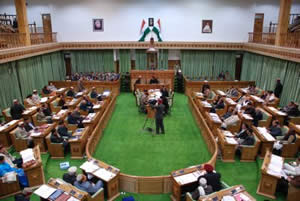Difference between Vidhan Sabha and Vidhan Parishad
Key Difference: The Vidhan Sabha or Legislative Assembly is the lower house in the six states that have a bicameral legislature or the sole house in the rest of the unicameral states. The members of this house are the direct representatives of the people of the particular state and are also elected by the adult citizens of that particular state. The Vidhan Parishad or the Legislative Council is the upper house in the six states that have a bicameral legislature. The members of the Vidhan Parishad are elected by members of the government, including the President.
 In order to understand the difference between the terms ‘Vidhan Sabha’ and ‘Vidhan Parishad’, it is important to understand the layout of the government system in India. The layout of the government is confusing for many people as there are many levels to the government that are responsible for different activities. Another reason for confusion is that India is not a simple democratic country or a republican country; it is a "sovereign socialist secular democratic republic". This means that is works in the frame work of a federal Westminster-style Parliamentary democratic constitutional republic. The frame work is a big complicated as it ensures it has multiple levels of different departments in the government, including Lok Sabha, Rajya Sabha, Vidhan Sabha and Vidhan Parishad.
In order to understand the difference between the terms ‘Vidhan Sabha’ and ‘Vidhan Parishad’, it is important to understand the layout of the government system in India. The layout of the government is confusing for many people as there are many levels to the government that are responsible for different activities. Another reason for confusion is that India is not a simple democratic country or a republican country; it is a "sovereign socialist secular democratic republic". This means that is works in the frame work of a federal Westminster-style Parliamentary democratic constitutional republic. The frame work is a big complicated as it ensures it has multiple levels of different departments in the government, including Lok Sabha, Rajya Sabha, Vidhan Sabha and Vidhan Parishad.
Let’s try and understand the various different levels of the government in decreasing order of power. The President of India is considered as the head of the state, while the Prime Minister of India is the head of the government and is independent of the legislature. The Legislative power is divided among two chambers of the government: The Lok Sabha and the Rajya Sabha.
The Lok Sabha or the House of the People is the lower house of the Parliament whose members are elected by citizens of India. The Rajya Sabha or the Council of states is the upper house of the Parliament whose members are selected by the President and the state and territorial legislatures. The Lok Sabha is considered to be much powerful than the Rajya Sabha, which shares many powers with the former. The powers of Lok Sabha include: Motion of no-confidence against the government, introduction of bills, pass bills (non-financial), shares powers with Rajya Sabha for impeachment of the president and judges. The Lok Sabha also cannot be dissolved in case of a National Emergency, during which the Rajya Sabha can be dissolved.
The Rajya Sabha and the Lok Sabha is at the national level. Now, the same distinctions follow in the state level. These states are known to have a bicameral legislature. Bicameralism is the feature of a Mixed Government. Bicameral legislatures require a concurrent majority to pass legislation. The six of the twenty-four states in India have divided jurisdiction between two similar levels: the Vidhan Sabha and the Vidhan Parishad.
The Vidhan Sabha or Legislative Assembly is the lower house in the six states that have a bicameral legislature or the sole house in the rest of the unicameral states. The members of this house are the direct representatives of the people of the particular state and are also elected by the adult citizens of that particular state. Members are limited to not more than 500 and not less than 60 (though this is disputed in some small states such as Goa). Each Vidhan Sabha runs for a five-year term, after which all seats are up for election. During a State of Emergency, the term can be extended or dissolved. The members of the Viban Sabha are known as MLA (Member of Legislative Assembly). The MLAs are directly elected by the public through an election. The Vidhan Sabha has special powers including a motion of no confidence against the government in the state, introducing money bills and it has a higher hand in passing ordinary bills in the state. In order to become a member of the Vidhan Sabha, a person must have certain qualifications: the person must be a citizen of India, should be 25 years old or above, should be mentally sound, should not have declared bankruptcy, should not have a criminal procedure pending against him/her.
 The Vidhan Parishad or the Legislative Council is the upper house in the six states that have a bicameral legislature. In case of unicameral states, there is no Vidhan Parishad. This house is applicable in states such as: Andhra Pradesh, Bihar, Jammu and Kashmir, Karnataka, Maharashtra and Uttar Pradesh. The size of the Vidhan Parishad cannot be more than one-third of the members of the Vidhan Sabha. However, it also cannot be less than 40 members, unless specified by an Act of Parliament. The Vidhan Parishad is also permanent, which means it cannot be dissolved during a State of Emergency. The members of the Vidhan Parishad are known as MLCs (Members of Legislative Council) and each member serves a six-year term. However, it is set up in a way that one-third of the Council’s members expire every two years. This is similar to the layount on the Rajya Sabha.
The Vidhan Parishad or the Legislative Council is the upper house in the six states that have a bicameral legislature. In case of unicameral states, there is no Vidhan Parishad. This house is applicable in states such as: Andhra Pradesh, Bihar, Jammu and Kashmir, Karnataka, Maharashtra and Uttar Pradesh. The size of the Vidhan Parishad cannot be more than one-third of the members of the Vidhan Sabha. However, it also cannot be less than 40 members, unless specified by an Act of Parliament. The Vidhan Parishad is also permanent, which means it cannot be dissolved during a State of Emergency. The members of the Vidhan Parishad are known as MLCs (Members of Legislative Council) and each member serves a six-year term. However, it is set up in a way that one-third of the Council’s members expire every two years. This is similar to the layount on the Rajya Sabha.
The members of the Vidhan Parishad are elected by members of the government, including the President. The MLC running for the post much be at least 30 years old, mentally sound, not bankrupt and on the voter’s list of the state for which he/she are running. Wikipedia states the manner in which they are chosen:
- One-third are elected by members of local bodies such as corporations, municipalities, and zilla parishads.
- One-third are elected by members of Legislative Assembly from among the persons who are not members of the Assembly.
- One-twelfth are elected by persons who are graduates of three years' standing residing in that state.
- One-twelfth are elected by persons engaged for at least three years in teaching in educational institutions within the state not lower than secondary schools, including colleges and universities.
- One-sixth are nominated by the governor from persons having knowledge or practical experience in fields such as literature, science, arts, the co-operative movement and social service.
The Vidhan Parishad has certain powers and procedures. The Vidhan Parishad elects a Chairman and Deputy Chairman. The powers of the Vidhan Parishad are quite similar to the Vidhan Sabha; however, in reality it is considered to be weaker in certain matters. A bill passed has more weight with the Vidhan Sabha, while the Vidhan Parishad can only delay the bill for a maximum of four months. There is no joint sitting of the Vidhan Sabha and the Vidhan Parishad. The Vidhan Parishad does not have any powers regarding passing money bills. The Council also does not have a vote of confidence, which means it cannot remove a government from office. The Council is created to have a guiding influence on the Assembly, rather than prove its rival.
The major difference between the two state legislative branches lies in the power each one has, the appointed term and how members are appointed. In the Vidhan Sabha, the members are appointed by the citizens and they serve a five year term. In the Vidhan Parishad, the members are appointed by multiple sources and serve a six year term. The Vidhan Sabha members have more power compared to the Vidhan Parishad, with the Vidhan Parishad believed to serve just a ‘helping role’ to the Sabha.
Image Courtesy: hillpost.in, balasahebpuri.wordpress.com









Comments
Himanshi Sharma
Sun, 02/11/2018 - 08:41
vishal
Sun, 10/29/2017 - 17:05
Sumit S.
Fri, 10/13/2017 - 15:29
Shakeel
Thu, 08/03/2017 - 16:08
Shiv
Sat, 07/22/2017 - 01:02
Jai kishan
Mon, 07/17/2017 - 15:21
Lakshaya
Sun, 07/02/2017 - 20:56
Hi Lakshaya, it means the latter, that the Rajya Sabha Can be dissolved during a National Emergency, but the Lok Sabha cannot be. However, we have rephrased the sentence for better clarification.
dbadmin
Mon, 07/03/2017 - 09:30
Harshpreet kaur
Thu, 06/08/2017 - 14:33
shilpa
Tue, 02/14/2017 - 17:01
Pages
Add new comment